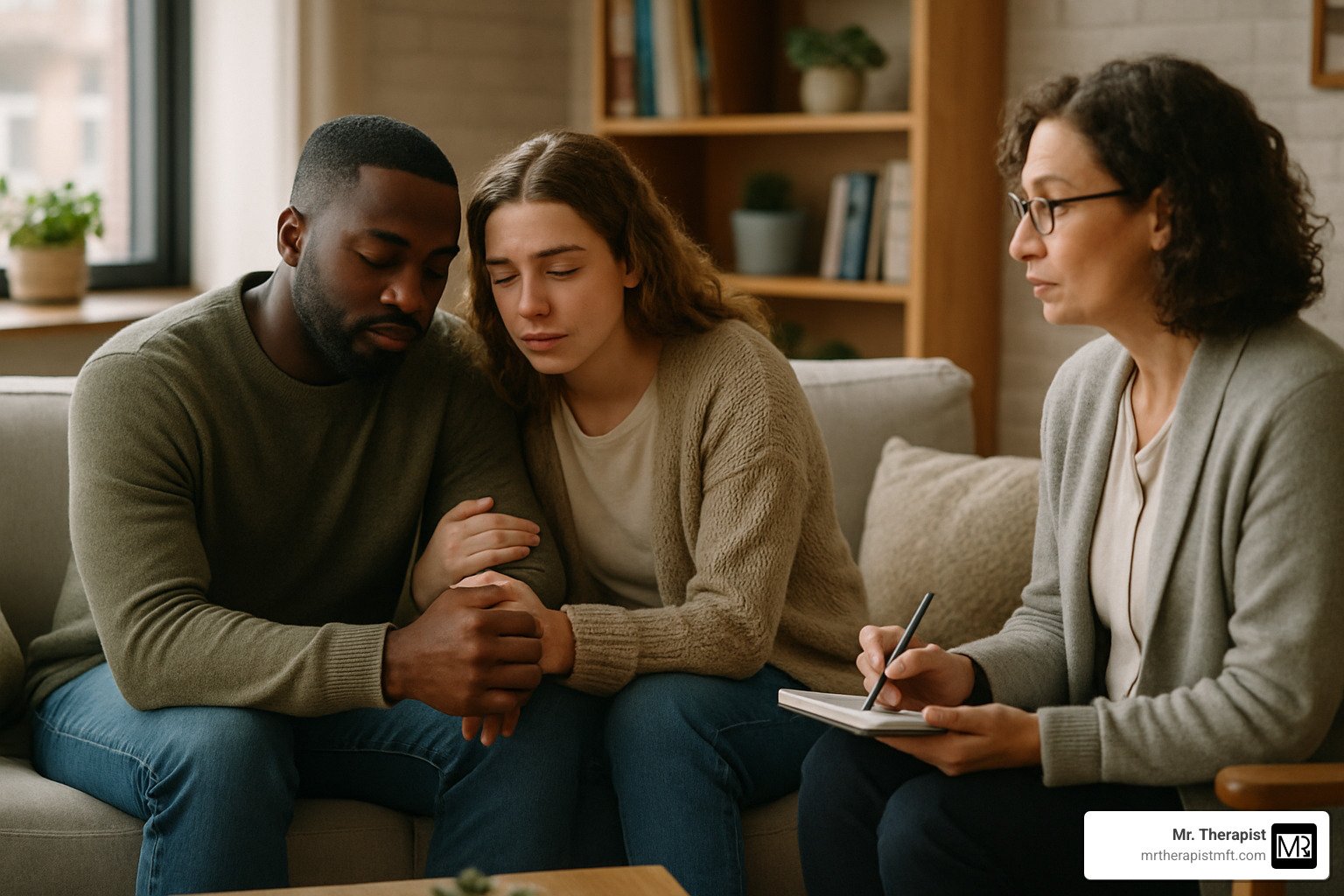
Finding Peace Through Anxiety and Stress Therapy
Anxiety and stress therapy can provide the relief you need to reclaim your peace of mind. If you’re feeling overwhelmed and anxious, you’re not alone. Many people struggle with anxiety disorders, which are one of the most common mental health conditions. The good news is these conditions are highly treatable through effective psychotherapies.
- Anxiety disorders impact 19% of adults in the U.S.
- Therapy is highly effective, with many patients noticing significant improvements.
- Common therapies include Cognitive Behavioral Therapy (CBT) and mindfulness-based interventions.
Have you ever felt like your worries are out of control, preventing you from enjoying life and connecting with loved ones? Anxiety can sneak in during crucial moments, whether before a big presentation or a personal event, leaving you feeling defenseless. But with the right therapy, you can learn to manage these feelings and live more freely.
Whether it’s Generalized Anxiety Disorder (GAD), social anxiety, or panic disorders, therapy offers custom strategies to help you cope and grow. From CBT to mindfulness practices, these methods teach you how to identify and challenge anxious thoughts. Your journey to emotional resilience and stronger personal connections begins with understanding and addressing these challenges through proven therapeutic approaches.

Understanding Anxiety and Stress
Anxiety and stress often get lumped together, but they are not the same thing. Understanding the difference can help you tackle them more effectively.
Stress vs. Anxiety
Stress is your body’s reaction to a challenge or demand. It can be caused by external factors like work deadlines, financial issues, or family problems. Stress is generally short-term and can be positive, pushing you to meet a deadline or tackle a problem. However, chronic stress can lead to health issues.
Anxiety, on the other hand, is more internal and involves a persistent feeling of worry or fear. While stress usually has a clear cause, anxiety can linger even without a specific trigger. It’s like an alarm that doesn’t turn off. When anxiety becomes overwhelming and affects daily life, it may be part of an anxiety disorder.
Symptoms
Anxiety and stress share some symptoms, but they also have distinct signs. Here are a few to watch out for:
- Stress Symptoms: Irritability, fatigue, headaches, and trouble sleeping.
- Anxiety Symptoms: Excessive worrying, rapid heart rate, insomnia, and muscle tension.

Causes
The causes of stress and anxiety can vary widely.
Stress is often linked to external pressures. Think of things like job loss, relationship issues, or moving to a new place. Even positive changes, like a wedding or a new job, can be stressful.
Anxiety can stem from various factors, including genetics, brain chemistry, and life experiences. Traumatic events, especially in childhood, can trigger anxiety disorders later in life. It’s also common for anxiety to run in families, hinting at a genetic component.
Understanding these differences is crucial for finding the right treatment. If you’re experiencing these symptoms, it might be time to explore anxiety and stress therapy. This can include methods like Cognitive Behavioral Therapy (CBT) to help you regain control and find peace.

Anxiety and Stress Therapy
When it comes to anxiety and stress therapy, three main types stand out: Cognitive Behavioral Therapy (CBT), Exposure Therapy, and Psychodynamic Therapy. Each has its unique approach to helping you manage and overcome anxiety.
Cognitive Behavioral Therapy (CBT)
CBT is one of the most popular therapies for anxiety and stress. It focuses on changing negative thought patterns and behaviors. Imagine your mind as a garden. Negative thoughts are like weeds. CBT helps you identify and uproot these weeds, replacing them with healthier thoughts.
A key part of CBT is cognitive restructuring. This technique helps you challenge and change unhelpful thoughts. For example, if you think, “I always mess up,” CBT encourages you to consider more balanced thoughts like, “I didn’t do great this time, but I can improve.”
CBT is effective for many anxiety-related issues, including phobias, panic attacks, and social anxiety. It’s a short-term therapy, often lasting 5-20 sessions, but its impact can be long-lasting.
Exposure Therapy
Exposure Therapy is like facing your fears head-on, but in a controlled and safe environment. It’s particularly useful for phobias and PTSD.
This therapy works by gradually exposing you to the things that trigger your anxiety. Let’s say you’re afraid of flying. In Exposure Therapy, you might start by looking at pictures of airplanes, then watching videos, and eventually visiting an airport. This step-by-step approach helps reduce your fear over time.
The idea is simple: by facing your fears, you learn they’re not as scary as they seem. Over time, your anxiety decreases, and you regain control.
Psychodynamic Therapy
Psychodynamic Therapy goes deeper, exploring the roots of your anxiety. It’s like peeling an onion, layer by layer. This therapy looks at how past experiences and unconscious thoughts influence your current feelings and behaviors.
Through discussions with your therapist, you gain insight into unresolved issues and emotional conflicts. This understanding can lead to meaningful changes in how you deal with stress and anxiety.
While Psychodynamic Therapy typically takes longer than CBT or Exposure Therapy, it can offer deep, lasting change by addressing the underlying causes of anxiety.
In San Clemente, CA, Mr. Therapist offers these therapies to help you on your journey from stress to serenity. Whether you’re dealing with everyday stress or more serious anxiety disorders, these therapies can provide the tools you need to manage your mental health effectively.
Next, we’ll explore some of the top therapy techniques for immediate anxiety relief, including deep breathing and mindfulness.
Top Therapy Techniques for Anxiety Relief
When anxiety strikes, having a few techniques up your sleeve can make all the difference. Here are some simple yet powerful methods to help you find calm in the storm.
Deep Breathing
Deep breathing is a straightforward way to reduce anxiety. It’s like hitting the reset button for your mind and body. When you feel anxious, your breathing often becomes shallow and rapid. This can make anxiety worse.
Here’s a quick exercise:
- Sit comfortably and close your eyes.
- Inhale slowly through your nose for a count of four.
- Hold your breath for a count of four.
- Exhale slowly through your mouth for a count of four.
- Repeat this cycle a few times.
Deep breathing sends a signal to your brain to relax. It lowers your heart rate and blood pressure, bringing immediate relief.
Progressive Muscle Relaxation
Progressive Muscle Relaxation (PMR) is another effective technique. It involves tensing and then relaxing different muscle groups in your body. This helps you become more aware of physical tension and learn how to release it.
Try this simple routine:
- Start with your toes. Tense the muscles for a few seconds, then release.
- Move up to your calves, thighs, and so on, until you reach your head.
- Focus on the sensation of relaxation as you release each muscle group.
PMR can be particularly helpful if anxiety makes you feel physically tense. It’s a great way to unwind after a stressful day.
Mindfulness
Mindfulness is all about staying present in the moment. It helps you break free from the cycle of anxious thoughts.
Here’s a basic mindfulness exercise:
- Find a quiet spot and sit comfortably.
- Focus on your breath, noticing each inhale and exhale.
- If your mind wanders, gently bring your attention back to your breath.
Mindfulness encourages you to observe your thoughts without judgment. Over time, it can help reduce anxiety by shifting your focus away from worries and towards the present.
These techniques are easy to practice and can be done almost anywhere. They’re valuable tools in your anxiety relief toolkit, providing quick and effective ways to manage stress.
In our next section, we’ll dive into medication and alternative treatments for anxiety, exploring options like antidepressants and herbal remedies.
Medication and Alternative Treatments
When therapy alone isn’t enough, medication can be a helpful addition to anxiety and stress therapy. Let’s explore some common options and alternatives.
Antidepressants
Antidepressants are often prescribed for anxiety disorders. They work by balancing chemicals in your brain that affect mood and emotions. The most common types are SSRIs (Selective Serotonin Reuptake Inhibitors) and SNRIs (Serotonin-Norepinephrine Reuptake Inhibitors). These medications can help reduce anxiety symptoms and improve overall well-being.
Here’s a quick look at some popular SSRIs and SNRIs:
| Medication | Type | Common Brand Names |
|---|---|---|
| Sertraline | SSRI | Zoloft |
| Paroxetine | SSRI | Paxil |
| Fluoxetine | SSRI | Prozac |
| Venlafaxine | SNRI | Effexor |
Note: Always consult a healthcare professional before starting or stopping any medication.
Benzodiazepines
Benzodiazepines are another class of medication used to treat anxiety. They work quickly to promote muscle relaxation and calm the mind. However, they are usually prescribed for short-term use due to the risk of dependence.
Common benzodiazepines include:
- Lorazepam (Ativan)
- Diazepam (Valium)
- Clonazepam (Klonopin)
These medications can be very effective for sudden anxiety episodes, but they should be used with caution and under medical supervision.
Herbal Remedies
For those seeking natural alternatives, herbal remedies might be an option. While not as extensively studied as pharmaceuticals, some herbs have shown potential in reducing anxiety symptoms.
Here are a few popular herbal remedies:
- Chamomile: Known for its calming effects, chamomile tea is a popular choice for reducing stress.
- Lavender: Often used in aromatherapy, lavender oil can help soothe anxiety when inhaled or applied to the skin.
- Passionflower: This herb may help with mild anxiety and insomnia.
While herbal remedies can be beneficial, they are not a substitute for professional medical advice. Always discuss with your healthcare provider before trying new supplements, especially if you are taking other medications.
Incorporating medication and alternative treatments into your anxiety management plan can offer additional support. However, it’s crucial to approach these options with care and guidance from health professionals. Up next, we’ll explore lifestyle changes that can further improve your journey to serenity.
Lifestyle Changes for Managing Anxiety
Lifestyle changes can play a significant role in managing anxiety. Let’s explore some effective strategies that can complement anxiety and stress therapy.
Exercise
Exercise is a powerful tool for reducing anxiety. It doesn’t just boost physical health; it also releases endorphins, which are natural mood lifters. According to research, as little as 30 minutes of exercise three to five times a week can significantly reduce anxiety levels.
Here are a few exercise ideas:
- Walking: A simple walk around the neighborhood can clear your mind and reduce stress.
- Yoga: Combines physical movement with mindfulness, helping to promote relaxation.
- Swimming: Offers both physical exercise and the soothing effect of water.
Healthy Eating
Healthy eating is another crucial component. A balanced diet can improve mood and energy levels, playing a role in anxiety management. Focus on:
- Whole grains: Provide a steady source of energy.
- Fruits and vegetables: Packed with vitamins and minerals that support brain health.
- Fish: Rich in omega-3 fatty acids, which are linked to reduced anxiety.
Avoid excessive caffeine and sugar, as they can increase anxiety symptoms.
Social Support
Social support is vital for managing anxiety. Connecting with others can ease feelings of loneliness and provide comfort. Here are some ways to improve your social connections:
- Join a support group: Sharing experiences with others who understand can be incredibly validating.
- Reach out to friends and family: Regular catch-ups, even virtual ones, can strengthen bonds and offer emotional support.
- Volunteer: Helping others can increase your sense of purpose and reduce anxiety.
Incorporating these lifestyle changes into your routine can provide a strong foundation for managing anxiety. They work best when combined with professional therapy and, if necessary, medication. Next, we’ll tackle some frequently asked questions about anxiety and stress therapy to further guide your journey.
Frequently Asked Questions about Anxiety and Stress Therapy
What is the best therapy for anxiety?
When it comes to anxiety and stress therapy, Cognitive Behavioral Therapy (CBT) often takes the lead. CBT is highly effective in changing negative thought patterns and behaviors. It helps individuals tackle anxiety by breaking down overwhelming problems into smaller, manageable parts. A person with social anxiety, for instance, learns to challenge the belief that others will judge them negatively.
Another powerful approach is exposure therapy. This technique gradually exposes individuals to their fears in a controlled environment, helping them build tolerance and reduce anxiety over time. Studies show that exposure therapy can lead to significant improvement for 60% to 80% of people.
How can I manage anxiety without medication?
Managing anxiety without medication is possible through a combination of self-care and relaxation techniques. Here are some effective strategies:
-
Deep Breathing: Simple yet powerful, deep breathing can quickly calm the mind. Try inhaling slowly through your nose, holding for a few seconds, and exhaling through your mouth.
-
Progressive Muscle Relaxation: This involves tensing and then slowly releasing each muscle group. It helps reduce physical tension associated with anxiety.
-
Mindfulness and Meditation: These practices focus on staying present and observing thoughts without judgment. They can help reduce anxiety by promoting a sense of calm.
Incorporating these techniques into your daily routine can significantly lower anxiety levels without the need for medication.
What are common symptoms of anxiety disorders?
Anxiety disorders often manifest through a mix of psychological and physical symptoms. Some common symptoms include:
-
Insomnia: Difficulty falling or staying asleep can be both a symptom and a contributor to anxiety.
-
Rapid Heart Rate: Often felt during anxiety attacks, this symptom can be alarming but is usually harmless.
-
Excessive Worry: Constantly feeling on edge or fearing the worst can be draining and affect daily life.
-
Irritability: Feeling easily frustrated or annoyed is another symptom to watch for.
Recognizing these symptoms early can lead to quicker intervention and relief. If you notice these signs interfering with your daily life, consider reaching out to a professional for guidance.
Conclusion
At Mr. Therapist, we believe in the power of emotional resilience and the importance of building healthy relationships. Our mission is to empower individuals to steer life’s challenges with confidence and courage. By focusing on Emotion-Focused Therapy (EFT), we guide our clients to accept their emotions as powerful tools for healing.
Emotional resilience is not just about bouncing back from setbacks. It’s about understanding your emotions and using them to grow stronger. Through our therapy services, we help clients develop the skills needed to manage stress and anxiety effectively. This approach fosters a deeper connection with oneself and others, paving the way for healthier relationships.
We understand that every individual’s journey is unique. That’s why our team, led by Manny Romero, tailors therapy to meet each client’s specific needs. Whether you’re dealing with anxiety, stress, or relationship issues, we’re here to support you every step of the way.
Building healthy relationships is a cornerstone of our practice. We believe that nurturing supportive connections can significantly improve your emotional well-being. Our therapy sessions focus on helping clients cultivate relationships that are based on trust, empathy, and mutual respect.
If you’re ready to take the first step towards a more fulfilling life, we invite you to explore our services. Together, we can work towards achieving emotional balance and strengthening your relationships.
Start your journey with us today. Find how our approach to anxiety and stress therapy can make a difference in your life. Learn more about our services here.



